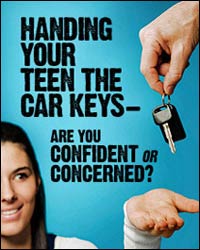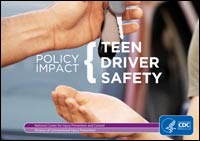CDC Resources: Safe Teen Driving
 CDC's Injury Center is committed to preventing teen crashes and related deaths and injuries.
CDC's Injury Center is committed to preventing teen crashes and related deaths and injuries.
Learning to drive is often considered a rite of passage for teenagers. But with the reward of being a new driver comes real risk. Car crashes are the leading cause of death for teens in the United States, taking the lives of eight teens a day. CDC's Injury Center is committed to preventing teen crashes and related deaths and injuries.
 According to a new CDC study, Drivers aged 16 or 17 years involved in fatal crashes—United States, 2004–2008 [PDF - 1.92 MB], published in Morbidity and Mortality Weekly Report (MMWR), the annual number of 16- and 17-year-old drivers involved in fatal crashes decreased by 36% from 2004 to 2008. The study states that graduated driver licensing (GDL) laws, or teen driving laws, that exist in 49 states can be credited at least in part for the reduction in death rates. These laws limit driving under high risk conditions for newly-licensed drivers, such as driving at night and transporting other teen passengers.
According to a new CDC study, Drivers aged 16 or 17 years involved in fatal crashes—United States, 2004–2008 [PDF - 1.92 MB], published in Morbidity and Mortality Weekly Report (MMWR), the annual number of 16- and 17-year-old drivers involved in fatal crashes decreased by 36% from 2004 to 2008. The study states that graduated driver licensing (GDL) laws, or teen driving laws, that exist in 49 states can be credited at least in part for the reduction in death rates. These laws limit driving under high risk conditions for newly-licensed drivers, such as driving at night and transporting other teen passengers.
However, since one out of every three teen deaths is the result of a motor vehicle crash, further reductions in teen crashes and related injuries are essential. CDC's new "Parents Are the Key" campaign and "Policy Impact: Teen Driver Safety" issue brief can help parents, policymakers, and others take steps to save young lives.
"Parents Are the Key" Campaign Launched Nationally
CDC developed the "Parents Are the Key" campaign to help inform parents across the nation about the key role they can—and should—play in protecting their teen drivers. Individuals and groups can use the "Parents Are the Key" campaign materials to help parents learn about the most dangerous driving situations for their young driver and how to avoid them. All of the campaign materials—including a parent-teen safe driving agreement, posters, fact sheets, video, social media tools, implementation guide, and more—are available free of charge at www.cdc.gov/parentsarethekey.
Policy Impact Brief Focuses on Teen Driver Safety

Policy Impact: Teen Driver Safety is the first in a new series of issue briefs highlighting key public health issues and important, science-based policy actions that can be taken to address them. In a simple, at-a-glance format, this new brief features critical information on the tremendous toll that crashes among teen drivers take, as well as CDC's recommendations for improving new driver safety. Highlights include information on leading causes of teen crashes and guidance on graduated driver licensing systems. The issue brief can be downloaded or ordered at no cost at www.cdc.gov/motorvehiclesafety/teenbrief.
By making these new resources available, CDC aims to provide parents, policymakers, and others with proven information on how to help teen drivers live to their full potential.
More Information
- MMWR: Drivers aged 16 or 17 years involved in fatal crashes—United States, 2004–2008 [PDF - 1.92 MB]
- Parents Are the Key: Campaign for Safe Teen Driving
 Policy Impact: Teen Driver Safety
Policy Impact: Teen Driver Safety- Facts and Resources about Teen Drivers
- Protect the Ones You Love: Road Traffic Injuries
- Parents Are the Key Facebook Page
- CDC TV Video: "Parents Are the Key to Safe Teen Drivers"
CDC works 24/7 saving lives and protecting people from health threats to have a more secure nation. A US federal agency, CDC helps make the healthy choice the easy choice by putting science and prevention into action. CDC works to help people live longer, healthier and more productive lives.
Get email updates
To receive email updates about this page, enter your email address:
Contact Us:
- Centers for Disease Control and Prevention
1600 Clifton Rd
Atlanta, GA 30333 - 800-CDC-INFO
(800-232-4636)
TTY: (888) 232-6348 - cdcinfo@cdc.gov



